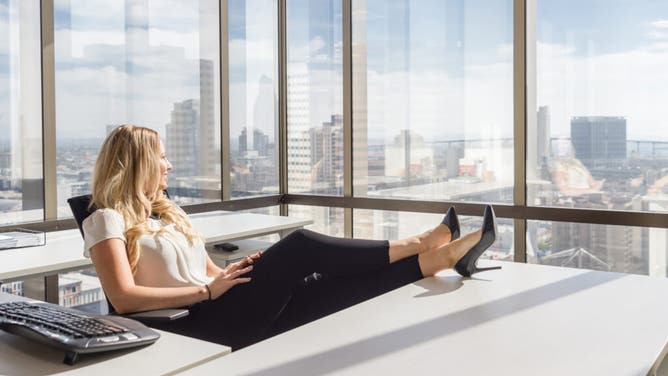Study Says Men More Likely Than Women To Benefit At Work From Being Attractive
Like it or not, "pretty privilege" is real.
If you're unfamiliar with the term, it's the idea that people who are more conventionally attractive have more advantages and opportunities compared to people who are less attractive.
Typically, we attribute pretty privilege to females. Hot women get free drinks at bars, attract the richest and most successful men and tend to get away with warnings instead of speeding tickets.
But according to an extensive new study, pretty privilege in the workplace belongs to the men.

Ready to go dunk on all those ugly dudes.
Researchers from the Polish Academy of Sciences found that good-looking men are more likely to land better jobs and make more money than similarly desirable women.
"Physical attractiveness matters both for males' and females' intergenerational social mobility outcomes, but it is more important for males," the study asserts — busting the age-old myth that only women benefit from their good looks.
And hot guys don't just have an advantage over women. The study revealed handsome men also out-earned average-looking or unattractive males.
"Across three measures of social mobility — education, occupation, and income— physically attractive males are more likely to be socially mobile than males of average attractiveness," the researchers declared.
Pretty Privilege At The Office
This study lasted a whopping 20 years.
Researchers selected 11,583 participants who were all just 15 years old, and they recorded the demographic and socioeconomic data of each participant. Interviewers also rated each individual on the following scale: very attractive, attractive, unattractive and very unattractive.
Kind of a weird thing to do to a bunch of 15 year olds, but it was for science.
Two decades later, when the participants turned 35, the researchers collected their updated socioeconomic data. They found those who had climbed the wealth ladder most drastically were men who were "very attractive" to begin with.
"The results show that there may be more to gain from attractiveness for males than for females and that, with each step on the attractiveness ladder (very attractive, attractive, unattractive, very attractive), males increase their advantage in income mobility," the researchers wrote.
These results held true despite outside factors like parental socioeconomic position, education levels and neighborhood conditions.

Probably contemplating why all the hot guys keep getting promotions.
While the findings were definitive, there are some obvious flaws in the study.
For starters, a person's attractiveness at 15 years old doesn't necessarily dictate their attractiveness for the rest of their lives. (As someone who was still very much in my chubby, awkward stage 20 years ago, trust me. I know.)
The study also does not account for women who quit their jobs after they married rich husbands (the ultimate pretty privilege), opted to become a stay-at-home mom or took other career paths not typical of their male counterparts.
Clearly, we don't have enough data. I look forward to an update in another 20 years.
Follow Amber on X at @TheAmberHarding or email her at Amber.Harding@OutKick.com.